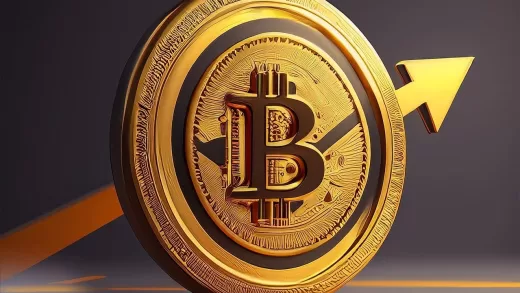As dawn breaks on the financial landscape, whispers of Bitcoin’s reawakening stir the air. No longer the domain of the digital avant-garde, the currency has begun an audacious ascent, capturing the gaze of investors worldwide. In this climate, the rumbling disquiet in traditional banking systems acts as a backdrop to the crypto phenomenon, setting in motion a narrative of resurgence for the once sidelined digital asset.
In a tale as old as trade itself, market dynamics paint a picture of resilience and rebirth. Bitcoin, emerging from the shadows of skepticism, rides a wave of mounting disillusionment with conventional financial institutions. It is amidst this unfolding drama that the protagonist of our digital age begins to shine, promising a chapter of rejuvenation in the world of currency and trade.
Traditional Banking Turmoil: a Catalyst for Change
As the pillars of traditional finance began to wobble, an opening emerged where Bitcoin could shine as a beacon of stability. The public watched in astonishment as venerable institutions, once thought invincible, faced liquidity crises and shuttered their doors, challenging the collective trust in centralized banking. This seismic shift in perception didn’t just stir fear; it sparked a surge of interest towards alternatives, casting a spotlight on the potential of cryptocurrencies to redefine the concept of money and trust.
| Aspect | Impact |
| Bank Failures | Loss of confidence in the banking system |
| Search for Stability | Growing curiosity and investment in Bitcoin |
| Cryptocurrency Appeal | Increased appreciation for decentralized solutions |
Sensing opportunity amidst chaos, investors and everyday people alike turned their gaze to digital assets that promised autonomous control of personal wealth. Demand for Bitcoin escalated as it became clear that, unlike traditional banks, it wasn’t susceptible to the same failures of centralized financial systems. Conversations around kitchen tables and boardrooms alike pivoted from the latest bank scandal to the mechanics of Bitcoin, cementing its role not as an outsider, but a legitimate contender in the financial arena.
Bitcoin’s Resilience Amidst Financial Uncertainty
In an era where traditional financial institutions are wavering, the crypto-king has shown a formidable ability to withstand the chaos, reinforcing its role as a digital safe haven. As confidence in established banks dwindles, the digital currency’s bounce back resounds as a testament to its robust underpinnings and the growing trust of its user base. This starkly contrasts with the fragility of conventional banking systems, and marks a pivotal moment in bitcoin’s resurgence as banks fail, spotlighting its potential to thrive amidst the ripples of financial disruptions.
Decentralization: the Allure in an Unstable Economy
In times of economic turbulence, the seduction of a system that operates outside of traditional financial frameworks becomes ever more apparent. As investors watch venerable institutions wobble, the merits of a decentralized network, free from the control of any single entity or government, begin to shine. It’s the autonomy and potential insulation from systemic risk that captures the imaginaire of savvy individuals looking for a safe haven for their assets.
This allure is not just philosophical; it’s also pragmatic. In a decentralized economy, power is distributed across the network, mitigating the risk of collapse centered in one institution or decision-making body. Trust is placed in the math and code of the blockchain, rather than the reputation of a potentially fallible financial institution. It is this inherent stability within the dynamic fabric of decentralization that draws increasing attention as a bulwark against an uncertain economic future.
Cloud Mining: a Gateway to Bitcoin Accessibility
As the financial landscape quakes, individuals across the globe are turning to innovative solutions to partake in the Bitcoin revolution. Cloud mining emerges as a beacon, allowing everyday users to mine cryptocurrency without the hefty investment in hardware or the burden of high electricity costs. This service democratizes access to Bitcoin, offering a slice of the mining pie to those previously marginalized by economic and logistical barriers.
Within this burgeoning sector, entrepreneurs and tech aficionados alike find a fertile ground for growth. Companies offering cloud mining platforms such as 1BitUp are pivotal in scaling Bitcoin’s network, bolstering not just accessibility but also reinforcing the network’s robustness. User-friendly interfaces and strategic partnerships with energy-efficient data centers mark a significant move toward greener, more inclusive cryptocurrency engagement, nudging Bitcoin ever closer to mainstream adoption.
Future Prospects: Bitcoin’s Position in Global Finance
As the world stares down the barrel of economic change, Bitcoin emerges as a protagonist in the narrative of global finance. With its underlying technology gaining mainstream acceptance, it stands poised to potentially redefine peer-to-peer transactions and international trade. A decentralized ledger unperturbed by sovereign borders suggests a future where digital currencies offer a stable alternative to traditional fiat, especially in countries facing hyperinflation or fiscal mismanagement. This scenario may see Bitcoin evolve from a speculative asset to a foundational element in the reimagining of global financial systems.
The march towards inclusion sees Bitcoin influencing policy frameworks and investment strategies alike. Financial institutions could soon find themselves at a crossroads, choosing either to adapt to the blockchain revolution or be left behind. The integration of cryptocurrencies in formal economic structures might herald a renaissance of sorts in financial literacy, promoting a more equitable distribution of wealth. Despite its volatile past, Bitcoin’s potential role as a diversifier in investment portfolios and as a medium for international remittances places it at the cusp of a new financial paradigm—where accessibility and security coexist within the digital ether.











![[Sponsored] STG Energy Launches Breakthrough Cloud Mining Product to Democratize Crypto Mining 10 STG mining](https://coinfunda.com/wp-content/uploads/2025/02/STG-mining-520x293.webp)
![[Sponsored] Centralhash cloud mining platform easily obtains 100,000 US dollars of 11 central hash](https://coinfunda.com/wp-content/uploads/2025/02/central-hash-512x293.webp)